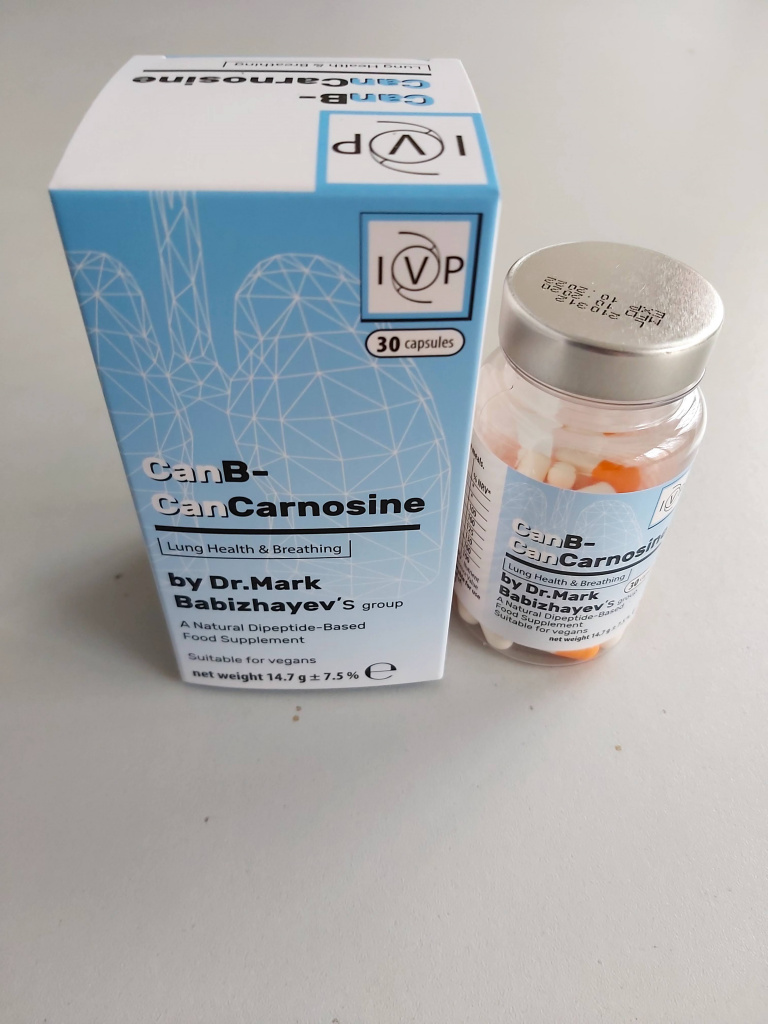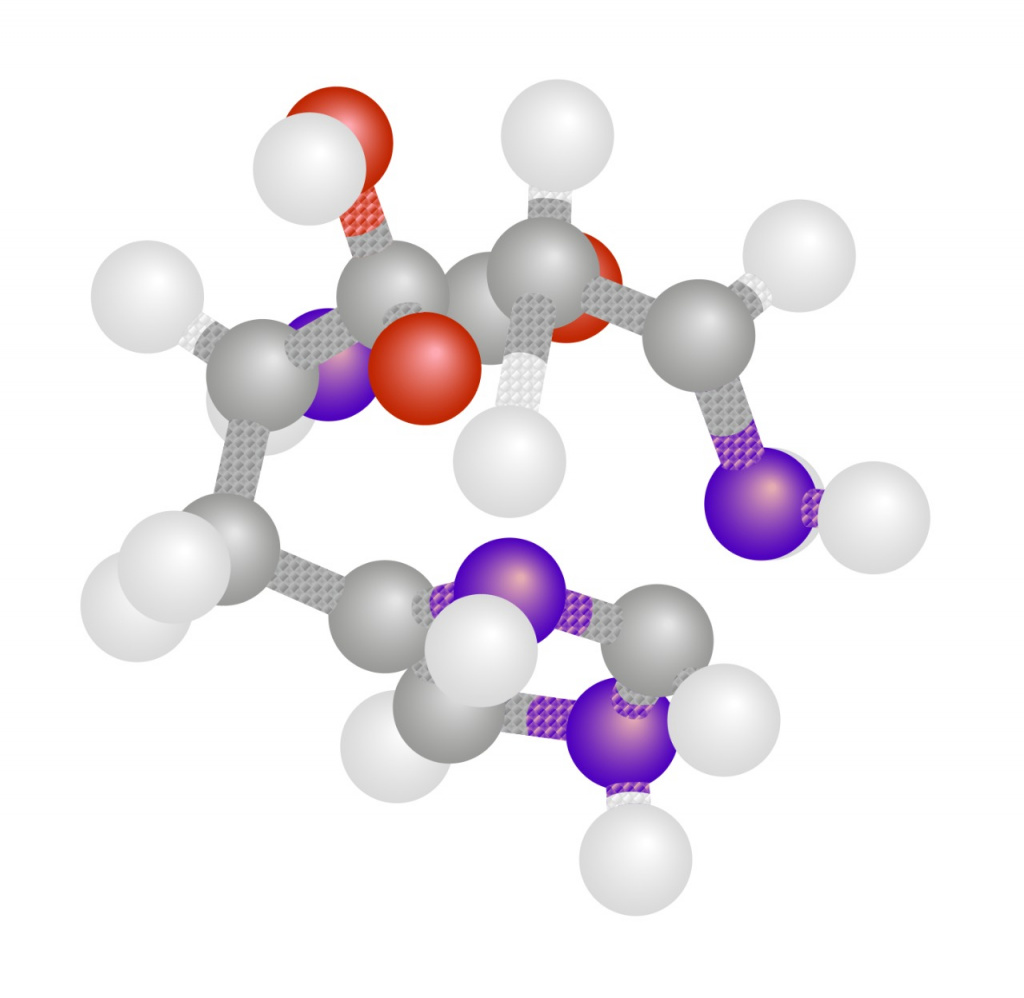Products
CanB-CanCarnosine
“I can breathe”

LUNG HEALTH AND BREATHING Complex
CanB CanCarnosine is a vitamin-mineral food supplement, manufactured in a GMP-certified facility, with a bioavailable combination of natural dipeptide L-carnosine, N-acetyl-L-cysteine, vitamins B3, B6, D, E and zinc, fully optimized for in-take and absorption by individuals of all ages and lifestyles, suitable for vegans. It provides a range of substances that are essential to support the body and promote respiration and lung function.
This formula contains vitamins vital for sustaining optimal health and for boosting immunity, a concept developed by Dr. Mark Babizhayev. It contains powerful antioxidants: Carnosine, especially efficient for lung, eyes and skin health, N-acetyl-L-Cysteine and Vitamin C protect the body from the harmful effects of drugs, toxic pollution and infections, as well as fight oxidative stress, which lies in the origin of cellular aging. The pharmacological composition of the supplement enhanced by Dr. Mark Babizhayev group, contains substances that are important for phisiological biochemical reactions in human tissues, ensure the correct course of metabolic processes, prevent cell destruction by free radicals, and regulate immune responses without damaging the immune system.
Why it is necessary & How It Works
Symptoms of seasonal infectious diseases include high fever > 37 ° C, chills and sweating, runny nose, sore throat, weakness, headache, muscle and joint pains, cough, fatigue, nausea, vomiting and diarrhea.
Older people and those with an underlying medical condition are more likely to develop serious complications, including primary virus pneumonia, secondary bacterial pneumonia, as well as inflammation of the brain, heart and vessels, and other serious complications.
Respiratory virus infection mostly causes airway inflammation. The pathogenesis of airway inflammation caused by respiratory viruses is complex and involves multiple inflammatory cells, cytokines, and mediators.
Direct viral cytotoxicity (referred cytopathic effect) is only a fraction of several types of events induced by virus infection.
Nitric oxide and oxygen free radicals such as superoxide anion (O2−• ) are generated markedly in virus-infected host boosts, and these molecular species are identified as the potent pathogenic agents. The mutual interaction of nitric oxide (NO) with O2−• resulting in the formation of peroxynitrite is operative in the pathogenic mechanism of virus pneumonia. Seasonal virus infection involves pathological events in which oxygen free radicals play an important role in the pathogenesis. The toxicity and reactivity of oxygen radicals generated in excessive amounts mediate the overreaction of the host ’ s immune response against the organs or tissues in which viruses are replicating, and this may explain the mechanism of tissue injuries observed in virus infections of various types.
Ingredients
 L-Carnosine (beta-alanyl-L-histidine) 250mg
L-Carnosine (beta-alanyl-L-histidine) 250mg
Carnosine, a naturally occurring dipeptide, acts as a neurotransmitter and neuromodulator of olfactory neurons and has an important feature of a specialized pH-buffer. Carnosine has the properties of an effective antioxidant, a chelator of Cu2+ and Fe2+ ions, which in free form catalyze the conversion of hydrogen peroxide into the OH radical. It causes a Carnosine-regulated respiratory burst in neutrophils, which may serve as a universal biological mechanism for fighting flu and other respiratory viruses. It also participates in the quenching of reactive oxygen species (ROS) and protects the body from alpha-beta unsaturated aldehydes formed from super oxidized fatty acids of cell membranes during oxidative stress through their chemical bonding. Carnosine inhibits the growth of amyloid fibrils, which are formed in Alzheimer's disease. Carnosine inhibits the type of oxidative damage associated with Parkinson's disease. Carnosine possess direct NO-trapping ability and acts as a multifunctional molecule in the pharmacological correction of NO, which might be one of the important factors of natural immunity in controlling the initial stages of virus infection and virus-induced regulation of cytokine gene expression.
N-acetyl-L-cysteine 80mg
N-acetyl-L-cysteine is a mucolytic expectorant and antioxidant agent used in the treatment of various infectious diseases, including respiratory diseases of the upper and lower respiratory tract, it is prescribed for treating otitis, rhinitis, and sinusitis. It has an antioxidant effect, based on the ability of its reactive sulfhydryl groups (SH-groups) to bind to oxidative radicals, neutralizing them. Promotes the synthesis of glutathione, an important component of the antioxidant system and chemical detoxification of the body. Due to the antioxidant effect, the anti-inflammatory property of acetylcysteine increases the protection of cells from the damaging effect of free radical oxidation, a characteristic of an intense inflammatory reaction. The antioxidant and anti-inflammatory effects of acetylcysteine are especially important in acute respiratory viral infections with fever and flu. These properties are due to suppression of the formation of free radicals and reactive oxygen metabolites responsible for the development of acute and chronic inflammation in the lung tissue and airways. Prophylactic use of acetylcysteine helps to reduce the frequency and severity of exacerbations of bacterial etiology in patients with chronic bronchitis and cystic fibrosis.
Zinc Citrate 40mg (13 mg of elemental zinc) (130% RDA)
Zinc is essential for more than 300 enzymes involved in the metabolism of DNA, other nudeic acids, fats, and carbohydrates, also for the key antioxidant enzyme superoxide dismutase. This mineral is essential for immunity, skin quality and hair renewal. Increased intracellular zinc concentrations efficiently impair replication in several RNA viruses. Zinc is essential for cell division and acts as an antioxidant, fighting free radicals. As anti-inflammatory agent zinc plays an important role in many biochemical pathways in the human body, including the gastrointestinal tract, the central nervous, immune, skeletal, and reproductive systems.
Vitamin C 80mg (100% RDA)
Vitamin C is a free radical scavenger that has anti-inflammatory properties, influences cellular immunity and vascular integrity. Participates in the regulation of redox processes, carbohydrate metabolism, blood clotting, tissue regeneration; increases the body's resistance to infections, reduces vascular permeability. It's an essential cofactor for various enzymes that make brain transmitters, manage the body's liver detoxification systems, and synthesize collagen molecules that strengthen the body's many connective tissues. Vitamin C may help increase glutathione levels by attacking free radicals first, conserve vitamin E. Vitamin C participates in the metabolism of tyrosine, folic acid, norepinephrine, histamine, iron, synthesis of lipids, proteins, carnitine, immune reactions, hydroxylation of serotonin, enhances the absorption of non-heme iron, inhibits the formation of prostaglandins and other mediators of inflammation and allergic reactions.
Vitamin D (as D3, cholecalciferol) 5mcg (100% RDA)
Vitamin D is an important protective factor against respiratory infections, this rationale is based largely on immunomodulatory effects that could potentially decrease the severity of illness. Vitamin D can reduce an inflammatory response. In view of a high incidence of lung fibrosis as a characteristic sequela of COVID-19, it is important to note that vitamin D prevents a TGF induced profibrotic phenotype of lung cells.
Vitamin E (as Alpha-tocopherol) 15mg (125% RDA)
Vitamin Eis the major antioxidant protector for membranes, the most dynamic cell zones. It helps protect omega-3s and other fatty acids, phospholipids, and coenzyme Q10 against damage. Vitamin E ingestion lowers the production of superoxides, it participates in the biosynthesis of heme and proteins, cell proliferation, tissue respiration, and other important processes of tissue metabolism, prevents hemolysis of erythrocytes, prevents increased capillary permeability and fragility. Vitamin E enhances T lymphocyte-mediated immune function in response to mitogens and IL-2, also neutrophil and natural killer function.
Nicotinamide (Vitamin B3) 16mg (100% RDA)
Vitamin B3 reduces TNF, IL-6, and IL-1 in stimulated alveolar macrophages and inhibits NF-kB activation. Expands small blood vessels (including the brain), improves microcirculation, has an anticoagulant effect, increasing the fibrinolytic activity of the blood. It is possessing detoxification properties. Vitamin B3 is a lipid-lowering and specific anti-pellagric agent. In the body, nicotinic acid is converted into nicotinamide, which is part of the coenzymes of dehydrogenases - (NAD and NADP), which carry hydrogen, is involved in the metabolism of fats, proteins, amino acids, purines, tissue respiration, carbohydrates - glycolysis and glycogenolysis, biosynthesis processes. Normalizes the concentration of blood lipoproteins; reduces the concentration of total cholesterol, LDL, reduces the cholesterol/phospholipid index, increases the content of HDL, which has an antiatherogenic effect. Niacin has anti-inflammatory effects in LPS-induced acute lung injury.
Vitamin B6 (as pyridoxine hydrochloride) 1.4mg (100% RDA)
Vitamin B6 reduces the function and proliferation of T-lymphocytes and inhibits cytokine/chemokine release. Vitamin B6 is highly involved in metabolism and is essential for normal functioning of the central and peripheral nervous system, Participates in the exchange of tryptophan, methionine, cysteine, glutamic and other amino acids. Plays an important role in the exchange of histamine, Promotes the normalization of lipid metabolism. This vitamin is essential for at least 100 enzymes that metabolize amino acids, fatty acids, and carbohydrates.
COMPOSITION:L-Carnosine (beta-alanyl-L-histidine) 250mg; N-acetyl-L-cysteine 80mg; Zinc Citrate 40mg (13 mg of elemental zinc); Vitamin C 80mg; Vitamin D (D3, cholecalciferol) 5mcg; Vitamin E (as Alpha-tocopherol) 15mg; Nicotinamide (Vitamin B3) 16 mg; Vitamin B6 (as pyridoxine hydrochloride) 1.4mg, L-Carnosine 250mg
Other Ingredients: Vegetarian capsule (hydroxypropyl cellulose).
30 capsules
Suggested Adult Use: One capsule daily before a meal or as directed by your doctor. Recommended duration of intake is 30 days, repeated 3-4 times a year matching periods of increased seasonal incidence.
Precautions & Warnings:This product is not intended to diagnose, treat, cure, or prevent any disease. It is recommended to consult a primary care physician/health practitioner of choice when considering the use of the product, especially if you are pregnant breastfeeding, taking any medication, planning any medical or surgical procedure or have any medical condition. Discontinue use and consult your doctor if any adverse reactions occur. For adults over the age of 18.
Manufactured in EU by Herballab Ltd., Bulgaria 5300 Gabrovo, 154 Orlovska str.;
for Innovative Vision Products
